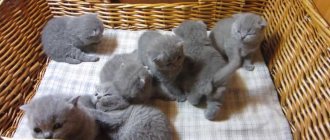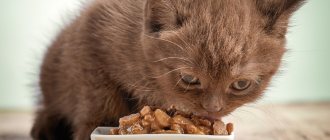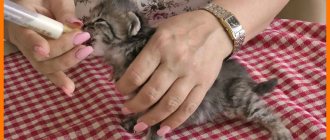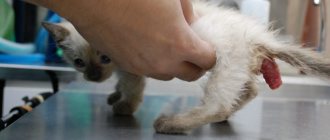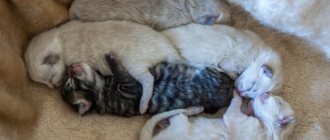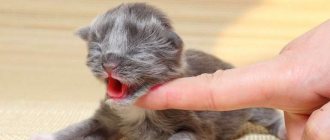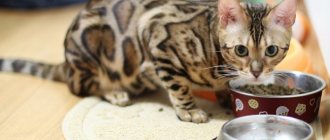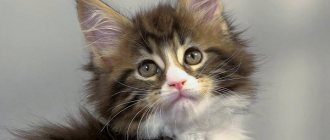When a small miracle appears in a family, all its members are very happy about this addition. However, cats are not toys! Everyone needs to understand that if you want to raise a healthy and cheerful cat, then you need to follow some rules.
This refers to the fact that a kitten has its own periods of growing up and forming, so during each of them, the owner must know what is happening with his kitten and how to take care of him. In this article we will discuss all the stages of a baby’s growing up from his first week of life to one year.
Kitten development from 1 to 16 weeks
First week
As everyone knows, kittens are born blind, but it is interesting that they also have no hearing. It begins to appear approximately on the 4th day of its life, but the kitten does not yet hear a clear sound. The umbilical cord completely falls off around the 3rd day.
The approximate weight of a newborn pet is 100 grams, and by the end of this week he will gain the same amount. As already mentioned, a kitten is born and remains blind for 14 days, but this does not prevent it from hearing the smell of mother’s milk, even at a distance of half a meter.
This food will be the most appropriate during the first two months, since mother's milk contains the necessary antibodies, which are so useful for the baby's development.
Since kittens cannot see anything, they need to feel that their mother is nearby, so try not to disturb family ties, but, on the contrary, take care of the comfort and warmth of these newborn babies.
Second week
Around the end of this week, pets should see the whole wide world for the first time. Although the hearing is already quite developed, it is still difficult for the baby to develop it. Within another half month it will be fully formed and then the kitten will be able to clearly determine where the sound is coming from.
This week the small animal may have a body weight of about 250 grams. Towards the end of the second week, they may try to walk, but it will be even more awkward and funny for them. They will also begin to communicate with their mother and brothers.
During this period, the kitten is very small and weak, so if the owners begin to gradually pet it, then they need to do it very carefully and with the utmost caution so as not to harm the pet.
You also need to teach this to your children, if you have any, and explain to them that you shouldn’t make your mother nervous during this period, because she is very worried about her cubs, so she can show her aggression.
Third week
This week, the little cat begins to stand on 4 legs and navigate in the distance. But so far she has a hard time doing this, so she often bumps into something and falls. Also, purrs learn to scratch themselves behind the ears, their first teeth appear, which will finish growing by the 2nd month of their life.
During this period, approximately one kitten weighs about 300-350 grams. In the third week, pets want to be a little active, so they will happily play with people, and at the same time they will get used to them. See the table for the kitten's weight at 3 months.
However, remember that you need to be careful, no sudden movements, large or heavy toys, etc. Explain to your children that you should not touch the eyes, mouth and nose of the animal, and you should not pull their tail or whiskers.
Fourth week
At this time, the kitten should have approximately 26 teeth. By six months, kittens' teeth change from milk teeth to molars. Therefore, you can start feeding babies with food other than milk. During this period, it is possible to prevent worms in each kitten.
During the 4th week, kittens gain about 100 grams more in weight. Also this week they need to be served clean filtered water in shallow bowls. In the future, make sure that water is always available to the animals.
Fifth week
By this stage, the cat is no longer actively caring for her babies, so access to constant milk is reduced, as a result you need to ensure that the kittens have something to eat in bowls.
Pet stores sell special liquid food for a specific month of the cat, you need to purchase exactly this one. Liquid food is easily absorbed by the pet's body, but you should not forget that they should also receive solid food.
For one kitten, 100 grams of food will be enough. This period is naturally the most difficult for both the owners and the kitten. But you need to survive it, so be patient.
To teach babies to feed on their own, remove the mother from them for at least three hours; when they get hungry, they will 100% look for food nearby and eat what they have. Also make sure that the kitten does not eat the food of adult cats; to do this, keep their bowls away from each other at a decent distance.
Little miracles are already starting to try to wash themselves - this, by the way, is a very important moment in the life of every cat, so make sure that each kitten has started this procedure. This is the time to think about a personal house for your pets. This could be a pillow or specially purchased houses or baskets for animals.
The main thing is that they should not be installed in drafts, passages or under the scorching sun. Give your new residents plenty of time, but remember that quiet time should always be present.
Sixth week
The cat receives less or no milk from its mother, which is why it is necessary to provide it with enough dry food. Pets need to be fed 6 times a day, but little by little, only 40 grams of food per meal is enough for them.
This is a very important period in which you need to monitor the stool of each animal. Since other food enters the body, it is unknown how the gastrointestinal tract will digest it. Therefore, if the stool is abnormal and lasts in this form for 3 days, immediately consult a veterinarian.
In the same way, parasites can be found in the stool, which need to be gotten rid of. An experienced specialist will also help you in this matter.
Try to pay enough attention to small animals, play with them and caress them - they really need it.
Seventh week
This week you will already notice that males are slightly larger than small females and this is normal. The diet should be the same - 6 times a day. However, from this week onwards, the kitten should only consume special food, and not mother’s milk.
The diet should include both dry food and liquid food. Carefully ensure that the kitten does not have diarrhea, because often without mother's milk, they have problems against this background. If this is observed, do not waste time, but urgently contact a specialist.
Eighth week
If by this week the baby has not been weaned from his mother, then this is the time to do it. After all, the kitten is already quite independent, besides, it has all its teeth and can eat solid food. Sometimes during this period, owners begin to sell or give away their small animals to good hands.
Therefore, if you have acquired such a furry friend, it is best to have him examined by a veterinarian. Let him do all the necessary procedures.
The eighth week is just right to accustom the kittens to all the necessary procedures, since they have already become a little stronger and have become independent. Therefore, inspect the ears and eyes, and clean them if necessary.
Also start combing your pet's fur with a special comb. If an animal is separated from its family, it is best to give the new owners some item or the pet’s favorite toy.
When the kitten comes to your new family, try to disturb it less, let it find out everything around and examine it. It is this way of getting to know the new place of residence that will be less painful for the new resident. Let your little children help him adapt quickly - don’t push him over unnecessary trifles.
During this period, the cat is considered independent and since it moves freely throughout the apartment, protect it from those objects that may be dangerous to it (poisonous flowers, small objects that can be swallowed, electrical wires).
Ninth week
During this period, your little four-legged friend must receive all the necessary vaccinations and undergo certain procedures. If you haven’t done this yet, don’t hesitate – it’s necessary for the health of your furry pet. In addition, you can find out everything you need about your little kitten from your veterinarian.
At a time when the cat is already old enough, you can find out how he interacts with his owners. For example, scientists say that you can take a cat by the withers and lift it slightly above the ground. If the baby behaves calmly, it means that he is completely disarmed in front of you, but if he hisses and breaks out, then there is a smell of mistrust or disrespect.
Tenth week
Now is the perfect time to tone up your animal's temperament. It is during this week that they are completely independent and amenable to learning. However, aggressive training can have a serious impact on the baby’s psyche and affect not only your relationship, but also the cat’s future behavior.
Therefore, teach him kindly and friendly, in your voice he should hear persistence, not rudeness.
Eleventh week
The very peak of the height for kitten pranks. The baby already feels completely free and independent. Even if he finds himself in a new family, by this moment he should have fully adapted.
Therefore, the cat will not sit still, but will rush to explore all corners of your apartment. It is for these reasons that it must be protected from various objects. For example, make sure your cat doesn't jump out of the window by either closing them or installing a strong mosquito net.
Also close the doors to the toilet, or better yet, close the lid on the toilet, because the kitten can fall head first into a hole with water. Make sure that the iron or stove is not left unattended.
Twelfth week
Usually around this week, kittens' eyes change. They can fully feed themselves, drink water, hear, see and touch. Animals are also becoming more and more dexterous and acrobatic.
If the cat was treated for worms within 4 weeks, now is the time to do it again. A normally formed and well-mannered cat should already respond well to the owner’s call, to its name, and also to the sounds of food being served.
If you observe aggression in the behavior of your animal, then it is worth taking some measures, otherwise it will be difficult to change the formed character. Train your pet as you play and reward him with treats.
Thirteenth week
At this age, a kitten should eat 5 times a day. It must be of high quality and balanced. It is best not to buy cheap food, because it will have a bad effect on the health of your handsome dog.
This week the cat should weigh about one and a half kilograms. Keep in mind that males and females are still developing.
Fourteenth week
At this moment, cats’ old teeth begin to fall out and new molars begin to emerge. You can consult a specialist about this.
Fifteenth week
This week, if the owners of the animal have decided that they will regularly trim its nails, they should begin this procedure. If you don’t know how to do this or are afraid, then it’s best to ask a master in your field to do it.
Kittens should also eat baby food five times a day.
Sixteenth week
The cat is already quite old and should have a body weight of approximately two kilograms. If you have already had a vaccination before, check with your doctor about the next vaccination. See also the vaccination table for a kitten up to one year old.
Ready-made feed
For 5-month-old kittens, a commercial diet is more beneficial. The dry granules contain vitamins and minerals. Nutrients not only help the kitten to develop properly and fully. They have a beneficial effect on the state of his digestive tract and immunity, reducing the likelihood of many diseases. For kittens, veterinarians recommend choosing food from the following categories:
- Holistics . This is the most expensive, but also the highest quality type of industrial power supply. The composition includes exclusively natural products. There are no flavor enhancers, emulsifiers or other chemicals that can cause irreparable harm to your pet's health.
- Super-premium is a high-quality food that also contains natural ingredients. Additionally includes fruits and vegetables.
- Premium – inferior in price and quality to holistic specialists. The composition contains substances, mineral components and vitamin sets that are useful for growing and developing babies. Kittens are allowed to use them without fear for their health.
Ban on low-quality products.
Budget options such as “economy” - Kitiket, Whiskas, Friskas, etc., are highly not recommended.
They contain few useful components, many flavor enhancers, flavorings, food additives and emulsifiers. Regular feeding of your pet with such products negatively affects the condition of the gastrointestinal tract, increasing the likelihood of various diseases.
Top five. Recommended ready-made food for 5-month-old kittens:
- ProPlan Optistart Junior is included in the premium category. Contains healthy and natural nutrients and has an affordable price. Not the best, but quite suitable for growing babies.
- Royal Canin - contains a high content of protein, vitamins and minerals. Used for feeding kittens aged 4-12 months.
- Orijen Cat & Kitten is a universal industrial food. It can be given to both kittens and adults. Contains protein.
- JOSERA Kitten Minette is a food that will provide the kitten with adequate nutrition and development. A special feature is the presence of a large amount of fiber. This substance improves the functioning of the digestive system. Especially recommended for long-haired purebred kittens. Fiber prevents the formation of hairballs in the gastrointestinal tract. Age range: 2-12 months.
- Hill's Science Plan Kitten Chicken – the products are of fairly good quality with a vitamin and mineral composition. A distinctive feature is that the granules are large in size, so they are ideal for mature, toothy kittens.
You cannot limit your kitten's diet to dry kibble alone.
The diet should be diluted with canned food, jellies and semi-moist food. It is advisable to select granules and canned food from the same manufacturer.
Sixth month
This month the pet has strong molars. If the prevention of worms is on schedule, then the next one must be done during this period. The kitten is already the size of an adult cat, and if it becomes larger, it is only because of the muscles or because of the fatty part, so it is always necessary to monitor proper nutrition.
Animals must be fed three meals a day.
The sixth month of a cat's life is very important as they mature sexually. Therefore, if you do not plan to breed her offspring, then it is during these months that it is best to sterilize the female.
Feeding mode
It is important not only to take a responsible approach to preparing a diet for your pet, but also to properly organize the nutritional system, observing the feeding regime. Food and feed are given to the kitten at a strictly defined time.
Important! Violation of the feeding regime can cause a failure of metabolic processes and disturbances in the functioning of the animal’s gastrointestinal tract.
To accustom your small pet to a feeding schedule, put the bowl in the refrigerator after eating. In between feedings, do not feed your pet with food from our table or other treats.
It is equally important to calculate calorie content and portion sizes. The kitten should not pass or be hungry. The average daily food intake should be on average 180-210 g with a predominance of meat products in the natural diet.
A five-month-old kitten should be fed 4 times a day. From six months onwards, transfer your pet to three meals a day, gradually increasing the portion size. We also note that by 6 months the kitten should already be accustomed to a specific diet.
What should you not feed a kitten at 5 months old?
Some foods, especially food from our table, can harm your furry pet. When feeding your pet naturally, food must be prepared according to certain rules. Food should be fresh, at room temperature. What should you not feed a 5 month old kitten?
Products that should not be in the diet of 5-month-old kittens:
- fatty, spicy, salty foods;
- sweets, baked goods;
- expired food, feed;
- legumes, fermentable foods (soybeans, beans, beans);
- potatoes, tomatoes, eggplants;
- raw offal;
- raw river fish;
- poultry with bones;
- marinades, smoked meats;
- ready-made food for dogs and adult cats;
- fatty meat, fish.
You should not give your kitten whole milk, fatty dairy products, frozen or raw meat, or fish without prior heat treatment. To avoid poisoning, calculate the portion of wet food correctly. They cannot be kept in a bowl for a long time. After opening, pates, mousses, and canned goods are stored in the refrigerator for no more than a day.
